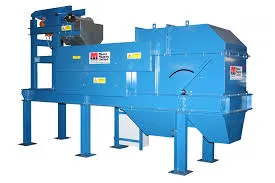

Nov . 16, 2024 14:46 Back to list
The Importance of Scrap Metal Processing Plants
In today's world, where sustainability and environmental concerns play a pivotal role in industrial practices, scrap metal processing plants have emerged as vital components of the recycling industry
. These facilities not only contribute significantly to waste reduction but also facilitate the recovery of valuable materials that can be reused in various manufacturing processes.Scrap metal encompasses a diverse range of materials, including aluminum, copper, steel, and brass. These metals are commonly found in discarded vehicles, old appliances, construction debris, and industrial byproducts. Instead of allowing these materials to sit in landfills, processing plants focus on collecting, sorting, and recycling them. This approach has several advantages, including the conservation of natural resources, reduction of energy consumption, and lowering greenhouse gas emissions.
One of the primary benefits of scrap metal processing is resource conservation. The extraction and processing of raw metals consume significant energy and generate large amounts of waste. By recycling metals, plants can minimize the need for mining and refining, which not only depletes natural resources but also disrupts ecosystems. For instance, recycling aluminum saves up to 95% of the energy required to produce new aluminum from ore. This conservation of energy translates to fewer carbon emissions, making recycling a more environmentally friendly option.

Moreover, scrap metal processing plays a crucial role in the economy. It creates jobs in the local community, ranging from collection and transportation to processing and sales. Many processing plants also engage in mechanical separation and shredding, which not only increases efficiency but also enhances the quality of the recycled material. This increased demand for skilled labor in the recycling industry has a positive multiplier effect, driving economic growth and development.
The technology used in scrap metal processing has advanced dramatically over the past few decades. Modern facilities utilize sophisticated machinery and equipment, such as conveyor belts, shredders, and magnetic separators, to streamline the sorting and processing of metals. These innovations not only improve efficiency but also increase the purity of the recycled metals, making them more valuable in the marketplace. As a result, businesses that source scrap metal are able to sell high-quality materials to manufacturers, creating a profitable circular economy.
Another pivotal aspect of scrap metal processing plants is their role in mitigating environmental hazards. Metals that are improperly disposed of can leach harmful substances into the soil and groundwater, posing health risks to both humans and wildlife. By ensuring proper recycling and disposal, scrap metal facilities help to prevent such environmental degradation. Additionally, these plants often adhere to stringent environmental regulations, further underscoring their commitment to sustainability.
In conclusion, the importance of scrap metal processing plants cannot be overstated. They serve as essential hubs of resource recovery, significantly reducing waste and conserving our planet's natural resources. As the demand for sustainable practices continues to grow, these facilities represent a forward-thinking approach to industrial operations. By supporting scrap metal processing initiatives, we can collectively contribute to a greener future, demonstrating that recycling is not just an option but a necessity in our modern world.
Latest news
The Future of Metal Recycling: Revolutionizing Waste Management
NewsMay.14,2025
Optimizing Waste with Recycling Lines
NewsMay.14,2025
Municipal Solid Waste Sorting Line: Revolutionizing Waste Management
NewsMay.14,2025
Metal Shredders: Essential Tools for Efficient Recycling
NewsMay.14,2025
Maximize Your Profits with a Copper Wire Granulator
NewsMay.14,2025
Home Metal Shredder: A Smart Choice for Your Home Recycling Needs
NewsMay.14,2025